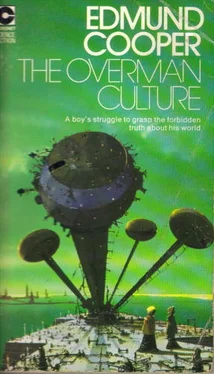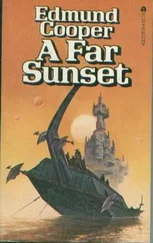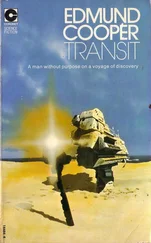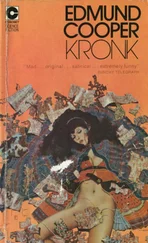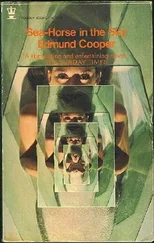Edmund Cooper - The Overman Culture
Здесь есть возможность читать онлайн «Edmund Cooper - The Overman Culture» весь текст электронной книги совершенно бесплатно (целиком полную версию без сокращений). В некоторых случаях можно слушать аудио, скачать через торрент в формате fb2 и присутствует краткое содержание. Город: London, Год выпуска: 1977, ISBN: 1977, Издательство: Coronet Books, Жанр: Фантастика и фэнтези, на английском языке. Описание произведения, (предисловие) а так же отзывы посетителей доступны на портале библиотеки ЛибКат.
- Название:The Overman Culture
- Автор:
- Издательство:Coronet Books
- Жанр:
- Год:1977
- Город:London
- ISBN:978-034017860
- Рейтинг книги:5 / 5. Голосов: 1
-
Избранное:Добавить в избранное
- Отзывы:
-
Ваша оценка:
- 100
- 1
- 2
- 3
- 4
- 5
The Overman Culture: краткое содержание, описание и аннотация
Предлагаем к чтению аннотацию, описание, краткое содержание или предисловие (зависит от того, что написал сам автор книги «The Overman Culture»). Если вы не нашли необходимую информацию о книге — напишите в комментариях, мы постараемся отыскать её.
The Overman Culture — читать онлайн бесплатно полную книгу (весь текст) целиком
Ниже представлен текст книги, разбитый по страницам. Система сохранения места последней прочитанной страницы, позволяет с удобством читать онлайн бесплатно книгу «The Overman Culture», без необходимости каждый раз заново искать на чём Вы остановились. Поставьте закладку, и сможете в любой момент перейти на страницу, на которой закончили чтение.
Интервал:
Закладка:
“I don’t know. I want to do it. I want to hold tight. I want to leave my hand there forever.”
He held her breast, let his fingers play with the hard small nipple. Emily shivered and began to breathe more heavily.
“Michael,” she murmured, “Michael, read to me. Read to me again. I want something to think about. I can’t think! I can’t think!”
Michael did not take his hand away. He looked at the book and said unsteadily: “The cat sits on the mat. The cat is fat. He has a red hat. His fur is black. He likes the mat.”
Then he let the book go and turned to Emily, lying as close to her as he could, feeling the softness of her body, still holding her breast, looking at her face which had become the face of a stranger.
And then he kissed her, and it tasted sweet. And it didn’t matter that strange and terrible fevers were racking his body. And reading was forgotten, and drybones didn’t matter anymore, and London itself was a world that was very far away.
10
Michael and Ernest and Horatio and Emily and Jane formed the habit of meeting in the Coffeehouse in the Strand on Saturday mornings. They were friends, they trusted each other. They had a private joke. They called themselves the Family.
Several other fragiles used the Coffeehouse besides the Family. There were, for example, Charles Darwin and Dorothy Wordsworth—who seemed to have formed a neat little family of two—Joseph Lister, James Watt and Mary Kingsley. But while the Family liked these fragiles and remained friendly with them, it never entirely trusted them.
The Family, as Ernest frequently reminded everyone, was something special. It was composed of people (Ernest affected a note of cynicism when he used the word “people”) who trusted each other entirely and would not knowingly betray any secrets.
Many drybones also frequented the Coffeehouse. For his own amusement, Horatio Nelson publicly affected to be a great liker of drybones—or not to notice the difference. He liked to cultivate the girls. Sometimes he would get them to go walking in the park with him; and then he would fondle them and kiss them. And he assured the Family that none of them had ever displayed any adverse reaction or showed any sign of pain when he bit their lips or pinched their breasts.
The drybones who came to the Coffeehouse were mostly people from high school or known adults. But occasionally there were one or two strangers.
One such stranger attempted to gain the confidence of the Family. He was the first drybone who genuinely seemed to want to communicate. Because of that, Michael was doubly suspicious.
The drybone had yellow hair and he was taller than any of the boys in the Family. He took his cup of coffee and came to their table.
“Do you mind if I sit here?” he asked with a smile.
“It’s a free country,” said Horatio coldly.
“At least,” amended Ernest, “so we have been told.”
Michael was sitting next to Emily. The drybone sat on the bench on her other side. Instantly, Michael hated him.
“My name is Aldous Huxley. I’m from North London High School.”
The Family looked at each other in surprise.
“We didn’t know there was a North London High School,” said Jane. “We—we thought ours was the only school in London.”
“Ah,” said Aldous Huxley, looking round as if to make sure he would not be overheard, “until recently we were in the same position. We did not know about Central London High School.”
Ernest studied him intently. “Do you have any people like us?” he asked, placing a slight emphasis on “us.”
“Yes.” Aldous Huxley leaned forward and spoke softly. “Have you noticed that nobody ever wants to talk about—about the difference? They treat us like children. I don’t want to be treated like a child. I want to know what it is all about. Don’t you want to know what it is all about?” He gazed at each of them in turn.
Michael and Ernest looked at each other. Suddenly, Michael sensed danger. “We are not worried,” he said easily. “We have good teachers. They will explain all we need to know when we are ready to understand.”
“But don’t you ever feel that there must be some kind of conspiracy?” said Aldous. “Don’t you feel that information is being deliberately kept from you—by your parents, as well?”
“But that’s exactly—” began Emily. Michael stopped her, pressing his leg hard against hers.
“—What we don’t feel,” he went on quickly. “There are lots of things that puzzle us. There are things we simply can’t understand. But we have confidence in our parents. If there are things they don’t want to tell us yet, there must be good reasons.”
Horatio gazed at him in astonishment, but Ernest picked up Michael’s line of thought without any hesitation. “We are not dissatisfied or unhappy,” he said. “We enjoy life. Do you people in North London have problems?”
Oddly, Aldous Huxley seemed puzzled for a moment or two, as if the conversation were developing in a way he had not expected. Then he recovered himself. “Take the question of reading. We find that they try to discourage us. Doesn’t that seem peculiar?”
“Not really,” parried Ernest. “Reading is not all that important. We can get all the information we really need from teachers, parents, television, radio, films…. Do you know what I think? I think you people in North London must worry too much. The main thing is to enjoy life.”
“What about the difference, then? Why don’t they explain clearly about the difference?”
“There are two possibilities,” said Michael. “One is that it is not important and the other is that it may be too difficult for us to understand yet…. I’m sorry, but my friends and I have to go now. It has been an interesting talk.”
“Why don’t we meet again—say next Saturday?” suggested Aldous. “I could bring some friends.”
“That would be splendid, but most of us are rather busy these days. Nice to have met you.”
They left Aldous Huxley drinking his coffee, and looking oddly as if he did not know what to do.
When they were outside the Coffeehouse, Emily said: “I can’t understand what’s happening. That is the first one who has really tried to talk to us, and you—”
“Not now,” said Michael softly. “Not now. Let’s go to Green Park. We’ll talk there.”
It was a warm bright morning, but there were not many people in Green Park. The Family found a patch of grass that was secluded enough for their purposes and sat down. They looked expectantly at Michael.
“Now listen to what I am going to say,” he began, “and then you can tell me I’m crazy. Emily was quite right. Aldous Huxley is the first one who tried to talk to us, and that is why I was afraid. He said he came from North London High School, of which we have never heard. It probably exists. If so, we’ll find it. But there is one absolutely basic principle for the survival of the Family. We must not let any drybone, however interesting he seems, get any useful information from us at all.”
“Hear, hear,” said Ernest. “Michael is dead right. We are children, we are babes in arms. They have all the power.”
“A drybone is a drybone is a drybone,” added Horatio with a grin. He turned to Jane. “If I bit your lip, Jane, you’d cry. If I pinched your breast you’d scream. If I hit you, you’d fall down. Not them. As we all know, they go on forever.”
Emily said helplessly, “We can’t stay in isolation. We can’t spend our lives like this.”
“We can, we must, we will,” retorted Michael fiercely. “Or until we know exactly what it is all about. We five are close. In a way we love each other. I suppose that is why we think of ourselves as the Family. But we are more than a family. We have to be. We are a sort of fighting unit—not in the sense of making war, but in the sense of being determined to discover the truth. The truth may be crazy—or it may drive us crazy. But we have to find the kind of truth that satisfies us, not the kind that could so easily be supplied by them. We can not let them find out what we are really like until we have found out what they are really like. We can accept no risks. Anything from a drybone at all, any act of friendship, should be suspect.”
Читать дальшеИнтервал:
Закладка:
Похожие книги на «The Overman Culture»
Представляем Вашему вниманию похожие книги на «The Overman Culture» списком для выбора. Мы отобрали схожую по названию и смыслу литературу в надежде предоставить читателям больше вариантов отыскать новые, интересные, ещё непрочитанные произведения.
Обсуждение, отзывы о книге «The Overman Culture» и просто собственные мнения читателей. Оставьте ваши комментарии, напишите, что Вы думаете о произведении, его смысле или главных героях. Укажите что конкретно понравилось, а что нет, и почему Вы так считаете.
